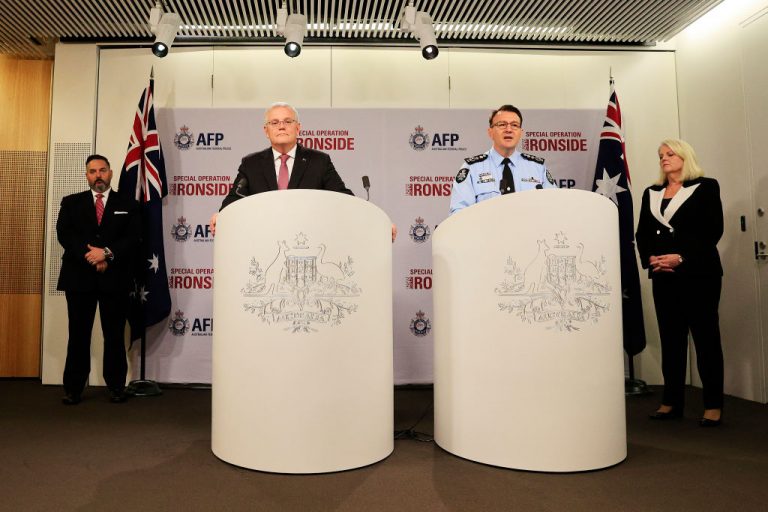The Australian federal government has given its law enforcement and intelligence community sweeping powers to surveil and crackdown on citizens deemed to be committing anything determined to be an “offense” in a bill that passed both houses of federal parliament on Aug. 25.
According to the Summary of the Surveillance Legislation Amendment (Identity and Disrupt) Bill 2020, the legislation amends existing Australian federal laws to give the Australian Federal Police (AFP) and the Australian Criminal Intelligence Commission (ACIC) three new abilities:
- Data Disruption – Described as the ability to “disrupt data by modifying, adding, copying or deleting data in order to frustrate the commission of serious offences online; and make minor technical corrections;”
- Network Activity Warrants – Described as the ability to “collect intelligence on serious criminal activity by permitting access to the devices and networks used to facilitate criminal activity;” and
- Account Takeover Warrants – Described as the ability to “take over a person’s online account for the purposes of gathering evidence to further a criminal investigation; and make minor amendments to the controlled operations regime to ensure controlled operations can be conducted effectively in the online environment.”
The 155-page bill also contains provisions shielding entities who cooperate with the government ordered surveillance from civil liability, while simultaneously levying a maximum penalty of 10 years imprisonment against anyone who resists.
‘Criminal network’
Of specific note is the Network Activity Warrants Section, which in defining a “criminal network of individuals,” creates verbiage that may allow the AFP and ACIC to earn surveillance warrants against all users in communications apps such as Telegram, Signal, Discord, WhatsApp, or others.
It defines a criminal network as a case “where each individual in the group uses, or is likely to use, the same electronic service as at least one other individual in the group” for the purposes of engaging “in conduct that constitutes a relevant offence.”
Success
You are now signed up for our newsletter
Success
Check your email to complete sign up
This also extends to services that enable any member of the targeted group to “communicate with any of the individuals in the group about any of the individuals in the group engaging in conduct that constitutes a relevant offence.”
The powers also apply to “another person (whether or not an individual in the group)” so long as they “facilitate the engagement” of “conduct that constitutes a relevant offence.”
Seizing control
The Account Takeover Warrants section allows the AFP and the ACIC to “to take control of one or more online accounts” so long as a warrant can satisfy a magistrate that three very broadly worded conditions are present:
- “One or more relevant offences have been, are being, are about to be, or are likely to be, committed;”
- “An investigation into those offences is being, will be, or is likely to be, conducted;”
- “Taking control of the online accounts is necessary, in the course of that investigation, for the purpose of enabling evidence to be obtained of the commission of those offences.”
Slippery slopes
The expansion of surveillance powers are concerning in light of trends demonstrated by state governments such as Victoria and New South Wales who have imposed some of the harshest and longest lasting lockdowns on their citizens seen in the English-speaking world.
In early August, NSW Premier Gladys Berejiklian demonized anti-lockdown protestors in the media saying she was “utterly disgusted” by what she characterized as “illegal protestors,” while NSW Deputy Police Commissioner Gary Worboys went a step farther when he called attending protests “violent, filthy, risky behaviour,” and, in a Chinese Communist Party (CCP) Cultural Revolution-style move, encouraged the public to report friends, family, and coworkers who participated to authorities.
Australia’s federal government deployed 300 members of the armed forces to Sydney, located in NSW and Australia’s largest city, to quash dissent.
In July, half a dozen NSW police descended on a tradesperson’s home in the middle of the night after the man, frustrated after his job site was forced to close in a new wave of lockdowns, made dissenting comments against Berejiklian and her policy on Facebook.
In Victoria, police, under the regime of CCP Belt and Road Initiative signatory Premier Daniel Andrews, deployed tear gas, rubber bullets, and pepper spray against demonstrators who likewise hit the streets in early August after residents of Melbourne entered their 200th day of total lockdown since the pandemic began in early 2020.
Andrews, in a similar fashion to Berejiklian, villainized protestors in comments to the media, “Some of the scenes on Saturday were not only disgusting, but they were absolutely unlawful…I will not really even call it a protest. It was a mob protesting all different things and a whole lot of them intent of having a fight, regardless of what brought them together.”
In June, a man in Alice Springs, a small town in the Northern Territory state was caught on video being harassed by police, handcuffed, and arrested for leaving his home to get a cup of coffee after the state was forced into a 72-hour “snap” lockdown because a single granite miner returned a positive PCR test. The man was fined $5,000 for the offense.
















